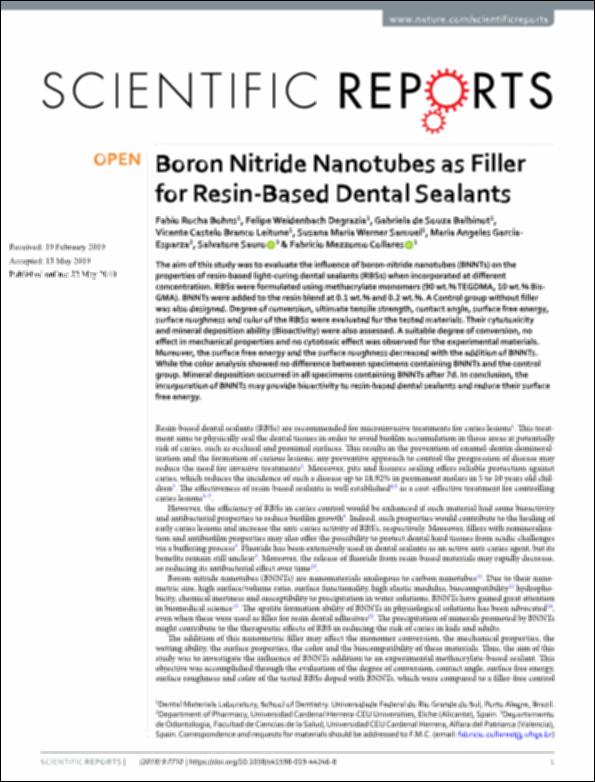Please use this identifier to cite or link to this item:
http://hdl.handle.net/10637/10909Boron nitride nanotubes as filler for resin-based dental sealants.
| Title: | Boron nitride nanotubes as filler for resin-based dental sealants. |
| Authors : | Rocha Bohns, Fabio Weidenbach Degrazia, Felipe Souza Balbinot, Gabriela de Branco Leitune, Vicente Castelo Werner Samuel, Susana Maria García Esparza, María Ángeles Sauro, Salvatore. Collares, Fabrício M. |
| Keywords: | Caries dental - Tratamiento.; Gums and resins in Dentistry.; Dental caries - Treatment.; Dental materials.; Gomas y resinas - Aplicaciones en Odontología.; Materiales dentales. |
| Publisher: | Springer Nature. |
| Citation: | Rocha Bohns, F., Weidenbach Degrazia, F., Souza Balbinot, G., Branco Leitune, VC., Werner Samuel, SM., García-Esparza, MA. et al. (2019). Boron nitride nanotubes as filler for resin-Based dental sealants. Scientific Reports, vol. 9, art. 7710 (22 may.). DOI: https://doi.org/10.1038/s41598-019-44246-8 |
| Abstract: | The aim of this study was to evaluate the infuence of boron-nitride nanotubes (BNNTs) on the properties of resin-based light-curing dental sealants (RBSs) when incorporated at diferent concentration. RBSs were formulated using methacrylate monomers (90 wt.% TEGDMA, 10 wt.% BisGMA). BNNTs were added to the resin blend at 0.1 wt.% and 0.2 wt.%. A Control group without fller was also designed. Degree of conversion, ultimate tensile strength, contact angle, surface free energy, surface roughness and color of the RBSs were evaluated for the tested materials. Their cytotoxicity and mineral deposition ability (Bioactivity) were also assessed. A suitable degree of conversion, no efect in mechanical properties and no cytotoxic efect was observed for the experimental materials. Moreover, the surface free energy and the surface roughness decreased with the addition of BNNTs. While the color analysis showed no diference between specimens containing BNNTs and the control group. Mineral deposition occurred in all specimens containing BNNTs after 7d. In conclusion, the incorporation of BNNTs may provide bioactivity to resin-based dental sealants and reduce their surface free energy. |
| Description: | Este es el artículo que se ha publicado de forma definitiva en: https://www.nature.com/articles/s41598-019-44246-8 |
| URI: | http://hdl.handle.net/10637/10909 |
| Rights : | http://creativecommons.org/licenses/by/4.0/deed.es |
| ISSN: | 2045-2322 (Electrónico). |
| Issue Date: | 22-May-2019 |
| Center : | Universidad Cardenal Herrera-CEU |
| Appears in Collections: | Dpto. Odontología |
Items in DSpace are protected by copyright, with all rights reserved, unless otherwise indicated.


